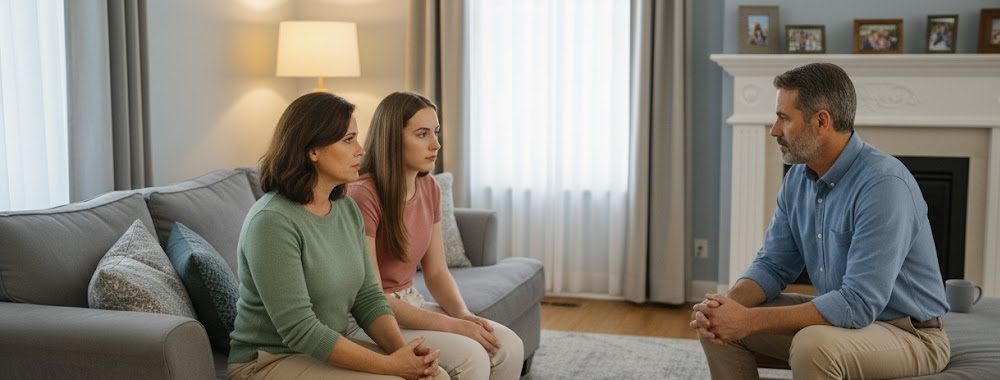If your teen shuts down when you try to talk, you’re not alone. Many parents face this same challenge.
Teens are balancing school stress, social pressure, and emotions that shift daily. These moments can cause distance, frustration, or silence between parent and child, resulting in difficulties in parent and teenager communication.
At Adolescent Wellness Academy, we help families rebuild connection through communication that heals, not harms.
Why Communication Breaks Down During the Teen Years

The teenage years are filled with change. Your teen is growing more independent while still needing guidance and support. This mix of freedom and structure can cause friction at home. Parents want to protect, while teens want space.
The result is often tension, misunderstandings, or quick arguments that leave everyone hurt.
Hormonal, social, and neurological changes all play a role. According to the American Psychological Association, teens experience emotional highs and lows that can affect communication. They may interpret a parent’s concern as criticism or control. Parents, on the other hand, might feel rejected when their teen pulls away.
AWA helps families recognize these emotional patterns and rebuild trust through small, consistent changes.
Our licensed therapists guide parents in learning how to listen actively, improving parent and teenager communication. We help families recognize when emotions, not words, are causing the real conflict. With empathy and structure, parents and teens begin to understand each other again.
Signs That Communication With Your Teen May Need Support
Some family tension is normal. But when communication feels impossible, it may signal something more profound. Maybe your teen avoids eye contact or retreats to their room after every disagreement. Perhaps conversations quickly turn into shouting matches or long periods of silence. These patterns can leave parents feeling powerless and teens feeling misunderstood.
The National Institute of Mental Health notes that early emotional stress can affect long-term well-being (NIMH). Ignoring signs of disconnection can complicate problems to resolve later, which can be prevented with teen therapy.
Common red flags include:
- Your teen refuses to share feelings or thoughts.
- Arguments happen more than calm talks.
- You feel like your advice always meets resistance.
- Your teen seems withdrawn or defensive about everything.
AWA’s team uses family-based therapy to address these challenges. Our programs include communication training that strengthens understanding on both sides. We help families practice empathy in real situations. By learning new techniques, parents and teens can replace conflict with connection, as discussed in a previous article on helping your teen.
Through open dialogue, we teach parents to see emotional signals instead of just behavior. When both sides feel heard, progress becomes possible. Families often tell us they start enjoying time together again within weeks.
How AWA’s Family-Based Treatment Improves Parent-Teen Communication
At Adolescent Wellness Academy, we believe healing happens as a family. Our Family-Based Treatment Center in South Florida focuses on strengthening bonds through open dialogue and empathy. Every session blends clinical expertise with compassion and real-life application, helping you improve how to talk to your teenager.

Our therapists use evidence-based approaches like Cognitive Behavioral Therapy (CBT) and Dialectical Behavioral Therapy (DBT). These methods help identify negative thought patterns that damage communication. For example, CBT helps parents and teens challenge assumptions before arguments begin. DBT encourages emotional regulation and mindfulness to prevent outbursts during stressful conversations.
Research from the Child Mind Institute supports these strategies. It shows that teaching teens emotional awareness improves relationships and reduces family conflict. AWA incorporates these findings into our programs every day.
Our sessions include role-playing exercises that model healthy discussion. Parents learn when to step back, when to ask questions, and how to validate feelings. Teens learn to express frustration without disrespect or avoidance.
This balance builds lasting trust. Family-Based Treatment also includes structured family sessions each week for parent and teenager communication. Therapists guide parents and teens in practicing open, calm communication. These meetings allow everyone to see progress in real time.
Practical Tools for Parents: How to Talk So Your Teen Will Listen
Every family communicates differently. However, small daily choices often make the biggest difference.
AWA gives parents tools that work in real homes with real challenges.

- Active listening helps teens feel seen and understood.
Instead of offering advice first, reflect what your teen says.
For example: “It sounds like you’re stressed about that exam.”
This approach builds emotional safety and shows empathy. - Ask open-ended questions to keep conversations going.
Questions like “How did that make you feel?” invite more than yes or no answers.
These prompts encourage openness without pressure. - Timing matters in every discussion.
Choose calm moments to talk, not during arguments.
This prevents defensiveness and encourages honest responses. - Empathy before advice is key.
Teens want understanding before direction.
Saying “That must be tough” creates space for connection.
Advice can come later, once emotions settle.
Finally, collaborative problem-solving builds teamwork within the family. According to Harvard’s Center on the Developing Child, involving teens in decision-making strengthens responsibility and respect. AWA integrates these methods into our sessions.
We help parents shift from controlling to collaborating. Parents tell us these changes transform how their family interacts. Conversations become calmer. Teens become more open. Everyone begins to feel like they’re on the same team helping the parent-teen relationship.
Why Family-Based Therapy Works
Traditional therapy focuses on the individual. Family-based therapy heals the system that surrounds the individual. At AWA, we know that every relationship influences recovery. When communication improves, so does emotional health. Family therapy provides a safe space for shared understanding. It helps parents see their teen’s world with empathy. Teens learn that expressing emotions doesn’t mean losing independence.
Our approach includes regular family sessions, group therapy, and individual counseling for teen therapy. Each step reinforces skills taught in session. Families practice mindfulness, emotional regulation, and conflict resolution. With consistency, communication improves naturally.
Studies from the American Academy of Child and Adolescent Psychiatry confirm this approach. Research shows that family-based treatment enhances emotional regulation and reduces long-term conflict. These outcomes reflect what we see daily at AWA. Families often tell us their homes feel calmer within weeks of starting therapy. Parents rediscover confidence. Teens feel respected. Together, they create a home where listening replaces shouting.
Every family can improve communication. Sometimes, it just takes the right tools and guidance. AWA’s Family-Based Treatment Center offers programs that fit your family’s schedule.
How AWA’s Family-Based Approach Builds Connection
We provide both day and after-school therapy options for teens aged 13–17.
Our locations in Davie and Miami-Dade serve families across South Florida. Each center is designed to feel safe, welcoming, and judgment-free. Sessions include both parents and teens, ensuring everyone learns together.
Find Support for Your Family
If your home feels tense or disconnected, help is available. Our licensed therapists understand the challenges parents face.
You don’t need to manage this alone.
AWA provides compassionate care backed by years of experience in family therapy. Reconnecting with your teen begins with one conversation. We’ll guide you through it, one step at a time, improving parent and teenager communication.
Ready to Reconnect With Your Teen?
Adolescent Wellness Academy’s family-based treatment programs help parents and teens communicate better.
We teach evidence-based techniques that resolve conflict and strengthen family bonds. Together, we help families rediscover trust and empathy through teen therapy.
About the Author

Kimberly Carlesi
Therapist











